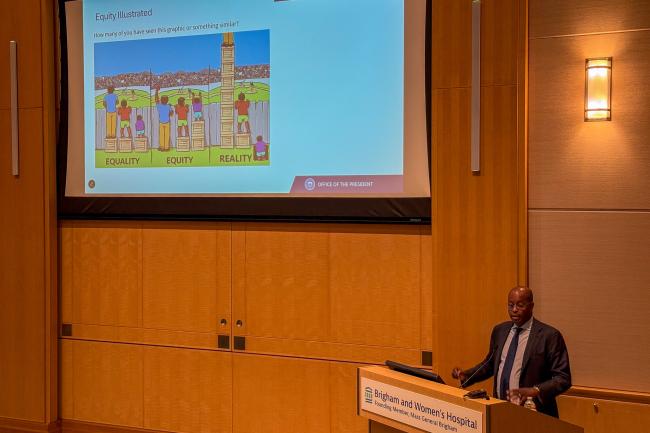Howard University Interim President, President Emeritus, and Charles R. Drew Professor of Surgery Wayne A. I. Frederick, M.D., M.B.A., FACS, served as the 2025 S. Lawrence and Judith Schlager Family Lecturer in Surgical Oncology at Harvard University on Oct. 21–22, 2025. Over two days, Dr. Frederick delivered companion talks that bridged governance, history, and data-driven public health: “Equity Through Empathy: The Human Side of Health Leadership,” followed by “Trends in Cancer Disparities: New Challenges and Opportunities.”
Opening his Oct. 21 lecture, Frederick stated that empathy is not a soft skill but a strategic capability that sustains trust, innovation, and equity in complex health systems.

“Empathy is the currency of equity,” Frederick emphasized, outlining how listening deeply, aligning institutional goals with community needs, and embedding empathy into hiring, training, and daily practice improve quality of care and organizational resilience.
Frederick underscored the moral obligations of health leaders in an era when artificial intelligence can both extend access and inadvertently magnify bias, noting that leaders must not only “do things right” but “do the right things” grounded in purpose and moral clarity.
During the lecture, Frederick expounded upon today’s leadership challenges in a longer historical arc, revisiting the legacy of the 1910 Flexner Report. While Flexner’s reforms standardized rigorous, science-based medical education, they also accelerated the closure of many Black and women’s medical schools, constricting pathways into the profession for generations.
Frederick linked this history to present-day imperatives: cultivating mentorship, broadening opportunity, and designing systems that dismantle structural barriers rather than entrench them. He cited Howard’s own lineage of surgical leadership and mentorship, exemplified by figures such as his mentor LaSalle D. Leffall Jr., MD, as a model for advancing excellence through equity.
True moral leadership touches hearts, builds trust, and inspires others to imagine and create a better future.”






